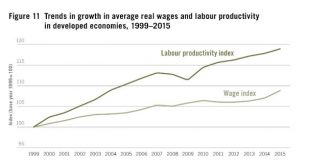So the Lord God said to the serpent, “Because you have done this, cursed are you above all livestock and all wild animals! You will crawl on your belly and you will eat dust all the days of your life. And I will put enmity between you and the woman, and between your offspring and hers; he will crush your head, and you will strike his heel.” To the woman he said, “I will make your pains in childbearing very severe; with painful labor you will give birth to...
Read More »An Experiment with Basic Income
In 1795, the parish of Speen, in Berkshire, England, embarked on a radical new system of poor relief. Due to the ruinous French wars and a series of poor harvests, grain prices were rising sharply. As bread was the staple food of the poor, rising grain prices increased poverty and caused unrest. Concerned by the possibility of riots, the parish decided to provide subsistence-level income support to the working poor. The amounts paid were anchored to the price of bread. Each member of a...
Read More »IPA’s weekly links
Guest post by Jeff Mosenkis of Innovations for Poverty Action IPA’s Peace and Recovery initiative, led on the academic side by Chris, has an open call for funding. We define peace and recovery pretty broadly:Reducing violence and promoting peaceReducing “fragility” (i.e. fostering state capability and institutions of decision-making)Preventing, coping with, and recovering from crises (focusing on conflict, but also including non-conflict humanitarian crises), It also funds a variety of types...
Read More »Why labour markets don’t clear
This post originally appeared on Pieria in July 2014. Roger Farmer has a blogpost in which he shows that labour markets don’t clear. Specifically, employment varies with the business cycle, whereas the labour force participation rate and hours worked only show long-term secular trends. During cyclical downturns, therefore, we must conclude that there is more labour available than there are jobs. New Keynesians say that the reason for this is sticky wages. If only nominal wages could fall...
Read More »Peter Cooper — Fairness and a ‘Job or Income Guarantee’
Of the various criticisms leveled at a combined ‘job or income guarantee‘, ones appealing to fairness usually go along the lines that it would be unfair for healthy individuals outside the workforce to receive an income while others are occupied in jobs. In considering this objection, a number of points come to mind: heteconomistFairness and a ‘Job or Income Guarantee’Peter Cooper
Read More »Job guarantees for the disabled
It took me a while, but it has now dawned on me why job guarantees might be very popular in the U.S., even among the sick and disabled. The clue is in this response to a tweet from Nathan Tankus: It's not just a problem for the technically disabled. Health issues are the #1 reason why people miss work and lose jobs. Many are too weak or previously injured or old before their time. Until Medicare for all, JG with benefits would be a fantastic lift for many. — Bob Spencer (@binhkhe) August...
Read More »A very British disease
The desire to judge people's motives rather than addressing their needs is a “British disease”. We have been suffering from it for hundreds of years, cycling endlessly through repeated cycles of generosity and harshness. Each cycle ends in public outrage and an abrupt reversal: but the memory eventually fades, and the disease reappears in a new form. In this post, I outline the tragic history of Britain's repeated attempts to "categorise the poor". For centuries, successive British...
Read More »Peter Radford — The future of work is now
Forget anticipating the consequences of AI. Obsession with increasing shareholder value, returns, profit rate, and profit share is already transformed the traditional role of workers and the concept of work. Real-World Economics Review BlogThe future of work is nowPeter Radford
Read More »Productivity and Employment: A Cautionary Tale
Ah, productivity. Who knew that our whole prosperity was totally dependent on a concept as nebulous as this?To be sure, it doesn't sound nebulous. It is output per worker per hour. What is so difficult about that?The problem is how you define "output". Usually, we take this to mean GDP (gross domestic product), though we might use GNP (gross national product) or GVA (gross value added). In this post, I shall use GDP.As Diane Coyle has engagingly written, GDP is a deeply flawed measure....
Read More »We need to talk about productivity
"We need to discuss the complete disconnect between the marginal product of labour and labour wages," said Sir Chris Pissarides, speaking on the closing panel of the Lindau Economics Meeting.I tweeted this comment. Laurie MacFarlane of the New Economics Foundation promptly responded with this chart that brilliantly illustrates Sir Chris's point: "Quite why marginal productivity theory is still taught as something which explains the real world is beyond me," commented Laurie. Marginal...
Read More » Heterodox
Heterodox







